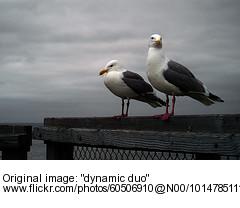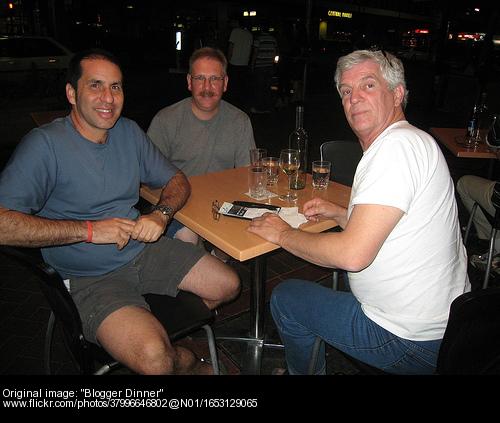A vibrant exchange with Al Upton in the comments section here on this blog had me challenged with his point about educators being involved in "rich ongoing online learning that is reflected in their students’ learning." What does that look like in the classroom? My classroom? Any classroom? Al was open about his class's efforts:
[My class blog and the kids’ individual blogs (although often a struggle with the basic aim to provide an initial exposure to online networks … 8 and 9 year olds) is my attempt as a teacher in an open sense. Our explorations of Quest Atlantis - a MUVE … a bit like SL but with built in learning quests and missions for 9-12yo is my attempt in a virtual 3D game like learning environment … in a walled garden sense :]
So while I'm swanning around cyberspace, twittering this and networking that, building up connections near and far, what benefit has it brought the students that I teach? It's time to document my efforts at global digital collaboration for my class - warts and all.
My class is part of a primary school ( the North American equivalent is elementary) covering from 5 year olds to 13 year olds. We call ourselves middle school students because the school is divided into learning teams - junior primary, middle primary and the Middle Years Learning Unit (MYLU). Basically we form part of a 4 classroom block - usually made up of Year (Grade) 6/7's but as all classes are composite (multiple year levels) and Australian classrooms are funded to be class sizes of 30 from Year 3 onwards, that's how why I'm co-teaching a 5/6 combination with slightly younger kids mixed into my class.
Anyway, MYLU classes collaborate on several levels and co-plan for cross-curricular units of work. This past term's over-riding theme was Communication and I floated the idea of covering this by setting up class global partnerships where they could actively work through the process of communicating about their respective parts of the world. Of course, I had to lead the way - both because my online networking and Web 2 tools skills would be required plus it was my turn to "lead out" on the unit of work. I knew it was important to convince my MYLU teaching colleagues that I knew what I was doing (even if it wasn't true) and to be able to model some options as they got going with their classes. I turned to one of the educators I trust and respect the most, Doug Noon, to see if he'd be keen to work with me and to see if this concept could work.
We both figured a wiki would be a good rallying point for our collaboration and so SpinTheGlobe was created. There's been several well publicised global wiki projects around that have been very successful - the Horizon Project wiki , initiated by Vicki Davis and Julie Lindsay, was one where I tagged in for a minor role as a peer review classroom - but I was keen to take a different approach and deliberately wanting to work in a low key and grassroots orientated way. This suited Doug as he also wanted to forge our own collective ideas rather than follow an established blueprint. He pointed out in one of our early e-mail exchanges about the possible gains for his students being that "These projects will involve my students and (hopefully) lead them toward a more global consciousness. That's my larger goal. For Alaskan kids, especially if they've never lived anywhere else, the larger world is a big unknown."
So, with the main idea being communicating how each other's parts of the world works, it was time for me to "lead out". I started the wiki, embedded some eye candy widgets to show location, time and temperatures of both locations and then got the class to brainstorm out what they already knew about our global partners a "spin of the globe" in Fairbanks, Alaska. It turned that they didn't know a lot - but we documented that on the wiki as a starting point and Doug got his kids to do the same. Then the tricky part of making collaborative decisions about which way to go came into play.
There are quite a few hurdles to be overcome in order to get a global project (even a grassroots one!) off the ground. The first hurdle is timing - my class were well settled with half a year of school under their belt and used to my "let's do this" approach to technology based learning while Doug was starting his school year with new kids, a new grade level and kids who weren't necessarily tech-savvy in the way required to be using the web and Web 2.0 tools in an efficient manner. The next hurdle was time - finding the time to commit to the project, then filling the time between waiting for Doug's students' next contribution with related work that maintained the interest and purpose. Another hurdle was our own communication patterns - ironic that the people who may learn the most about effective communication may be the teachers involved! I totally forgot to make Doug a wiki organiser at the start which created problems when he wanted to get his kids signed up. One of us would fire off an e-mail asking crucial questions or suggesting important changes in direction and the time differences or workload requirements would get in the way of a speedy and useful response.
But we got started. My class started posing questions on the wiki and Doug's started tagging Alaskan websites of interest in a del.icio.us account. Then my class started the same and using the Network feature both classes could look easily at each other's sites as a way of "frontloading" the students on a part of the world they know very little about. In this way, both groups were introduced to the power of social bookmarking and an image on one of the sites has become my reference point for demonstrating possibilities to my class. More on that shortly.
I also started my kids playing with FlickrStorm as a way of creating photogalleries of the topics up for discussion. That also produced important discussion as some kids were able to use the tool to stay focussed on the task at hand and others got distracted by the power of the tool. I even used this example in a comment on Doug's blog:
Working on the wiki for our “global partners”, I talked with the class about the idea of using photography as a way of communicating ideas about the Australian way of life. I let them loose using FlickrStorm to create a photo montage on a specific idea like Australian food, or money or sport. They had so much fun working out how FlickrStorm worked, using key words, adding images they liked to the download tray and then generating the final hosting page of images, that very few thought critically about the images they were choosing and what message they would send about our way of life. Reviewing these back in class as a group was very useful as we (the class as a whole, not just me) realised that the photo collections needed checking for validity and accuracy. Check the difference between the collection of Australian money images from one child who was able to keep the end goal in mind in contrast to the other student who got caught up in the moment. The class discussion when viewed on data projector was invaluable. What conclusions would someone draw when the US dollar features in the pics? But when I send the students back tomorrow in the computing room to review, fix and link in their image pages, I reckon the results will be much, much closer to achieving their goal.
We still haven't decided whether these galleries are a key ingredient in this project. Another major frustration is when a tool with potential turns out to have issues related to the school environment. I started playing with VoiceThread the other week and immediately got excited - in fact, I was convinced I had found the key to the next part of our collaboration. To set the scene, I focussed my trial example on an element of an image from one of the Alaskan websites showing an inukshuk, which I had never seen or heard of before. I grabbed images from FlickrCC for my VoiceThread, then recorded questions with each image. I saved it and then the next day, caught Chris Harbeck on Gmail Chat during my recess break. He, too, loves VoiceThread and offered to check out my example and add a voice comment. He did, even ignoring my mispronunciation of the word inukshuk, and I was sold. I started imagining South Australian and Alaskan student voices posing and answering questions via VoiceThread then writing up what they had learnt from their primary sources back at the wiki. I was so excited I showed my class my VoiceThread up on the interactive whiteboard. "I can't hear your voice very well, Mr.Wegner."
[kml_flashembed movie="http://voicethread.com/book.swf?b=7872" width="480" height="360" wmode="transparent" /]
Then it came to a grinding halt. My original example had been recorded at home and I soon found that VoiceThread doesn't work well from within our school environment - the images wouldn't upload and the record button took too long to activate and it basically bombed. I did find out from Chrissy Hellyer (during a chatcast for Kim Cofino's parent Web 2.0 presentation in my lunch hour) that she had similar issues at her school but they were solvable by unblocking a specific IP address and a certain port on the server. She also emphasised the worth of pursuing a solution as VT has a lot of great collaborative potential. So that is something still to work on.
But it does bring up another thing to consider when "going global" in your classroom - don't assume that your access to web technology is the same as your partner's. Doug's class hit the issue of student emails in order to create unique identities for student work on the wiki. At my school all students from Year 3 have an email address that is packaged up with their internet logon. Not so at Doug's school. There may be other bandwidth issues to consider. Certain sites may be blocked or filtered at one end but not the other.
Still, I'm pretty pleased with our progress so far with our grassroots global collaboration. Why do I refer to it as grassroots? Well, both Doug and I are committed public educators (he's a bit more vocal about it than me) and we weren't shooting for any high concepts that seem to be the topic of flavour 'round the edublogosphere. Just because an issue is high priority in the networks doesn't mean that our age students will be all that engaged. What they are interested in is themselves and how they might be perceived by others. So, if all Doug and I do is raise some awareness that yes, your way (the students) of acting and thinking isn't the only way and to debunk some misconceptions about our respective parts of the world.
We now know there are no penguins in Alaska !
 Being in this role of Coordinator over the past five years has been a real eye opener for me. Although it is officially a first step role for official leadership in schools, it does open new perspective of the so called advantages of being a leader. I've been sitting on the fence, not in an indecisive way but in terms of that I still have a foot in both camps. I'm still a classroom chalkface practitioner for 3/4 days a week with my own bunch of 30 individuals to teach, assess, build relationships and manage in that time. But the rest of my role involves budgets, crystal ball gazing, planning and implementing, reacting to and juggling requests and crises, and doing a bit of leading out in keeping our school moving forward towards their "up-to-date- technology" vision (new vision coming soon!) whilst keeping everyone informed.
Being in this role of Coordinator over the past five years has been a real eye opener for me. Although it is officially a first step role for official leadership in schools, it does open new perspective of the so called advantages of being a leader. I've been sitting on the fence, not in an indecisive way but in terms of that I still have a foot in both camps. I'm still a classroom chalkface practitioner for 3/4 days a week with my own bunch of 30 individuals to teach, assess, build relationships and manage in that time. But the rest of my role involves budgets, crystal ball gazing, planning and implementing, reacting to and juggling requests and crises, and doing a bit of leading out in keeping our school moving forward towards their "up-to-date- technology" vision (new vision coming soon!) whilst keeping everyone informed.





